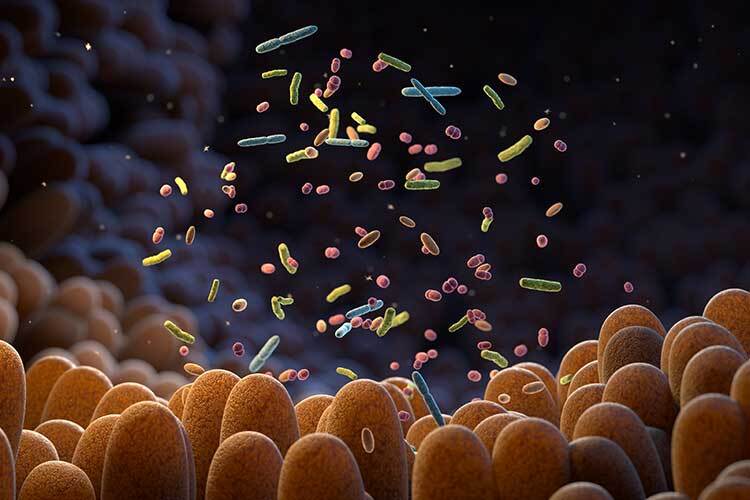We should think of the human microbiome as an ecosystem, a complex system with many species and interactions, and the microbiota as the species this consists of.
The microbiota includes all the microorganisms that live in our bodies. Together with their DNA, proteins, and other molecules, as well as their interaction with the environment, they form the microbiome.
The microbiome “is an ecosystem,” says Yocanxóchitl Perfecto, a research professor from Tec de Monterrey’s Guadalajara campus, when speaking to TecScience. Perfecto is referring to an increasingly common scientific view in which the trillions of microorganisms that inhabit our bodies are understood to offer a large variety of services or benefits to human health, in a similar fashion to the way ecosystems provide services to humanity.
These trillions of microorganisms are mainly bacteria, although they also include fungi, viruses, and parasites, to name but a few. All these beings are known as the microbiota. However, just like any ecosystem, the microbiota is not only composed of species but also of their interactions and activities.
The human microbiome is therefore defined as the set of all the microorganisms that live in association with the human body and the microbiota as a whole, with its DNA, proteins, and other molecules it produces. This also includes its interaction with the environment, namely, our bodies.
The Important Role of the Microbiome
The microbiome plays an essential role in practically all human functions and systems. “All systems are regulated by one or more products of the microbiota,” says Isaac González Santoyo, head of the cognitive neuroecology laboratory at the UNAM’s Faculty of Psychology.
What’s more, an increasing number of studies have shown that changes in the composition of our microbiomes, not only those in the gut, correlate to numerous pathological states, which suggests the possibility that manipulation of these communities could be used to treat diseases, according to the Human Microbiome Project (HMP).
Although there are microbiota in several parts of the body, such as the mouth, skin, and lungs the gut microbiota is considered the most important one for health.
How Can We Have a Healthy Microbiota?
“Although there is no answer as to what a healthy microbiota is,” says Isaac, “there are certain configurations that strongly correlate to health.”
“The first thing to know is who’s who: who the members of our gut microbiota are,” says Perfecto.
There are twelve groups of bacteria considered the core or most important groups; equilibrium between these twelve groups is an indicator of health. Although these groups are present in the vast majority of people, “the proportion of each group and how they change over time is something that affects human health,” explains Perfecto.
“If there are many bacteria from one group and very few from another, that alters functions and consequently health,” says González.
González Santoyo gives four main recommendations to keep the microbiota diverse, balanced, and functional: the conscientious use of antibiotics and antiparasitic treatments, eating a varied diet that is low in processed food, consuming probiotics (foods containing microorganisms that foster equilibrium in the microbiota), and reducing everyday stress.
“Antibiotics and antiparasitic treatments kill microorganisms. Varied diets, which contain fiber and all the macronutrients (carbohydrates, proteins, and fats), increase the diversity of organisms, as do natural probiotics, such as yoghurt, kefir, and ferments. Processed foods contain preservatives that are antimicrobial. Finally, a very stressful lifestyle generates adrenaline, which goes straight to the gut and affects bacterial diversity.”
There is a great deal of scientific evidence that relates various illnesses to an imbalance of the gut microbiota, such as inflammatory bowel diseases like ulcerative colitis, liver diseases like cirrhosis, chronic kidney disease, the three types of diabetes, respiratory diseases like bronchitis, heart diseases like hypertension, and lung, colorectal, pancreatic, and oral cancer.
What’s more, there is increasing evidence of how gut microbiota is associated with mental health. “The microbiota regulates nervous system functions. For example, many chemical messengers from this system, such as serotonin and dopamine, are produced by the microbiota or with its assistance. These chemical messengers are directly linked to mental health problems, such as anxiety, depression, Alzheimer’s, Parkinson’s, and autism.”
For Isaac, the evidence that is building up every day on the microbiome’s relationship with health is encouraging. “It’s like giving us back our health. The medical determinism that dictates how everything is hereditary is now discovering that it isn’t so, that many things depend on the environment and what we do, which means we have power over our own systems.”
Did you find this story interesting? Would you like to publish it? Contact our content editor to learn more at marianaleonm@tec.mx
















